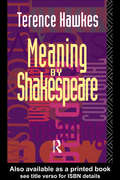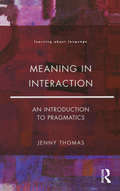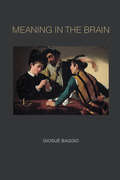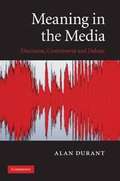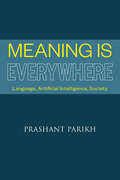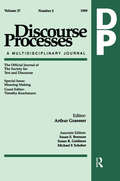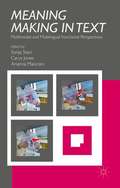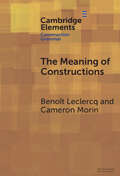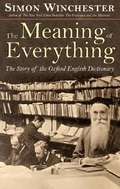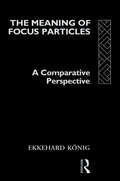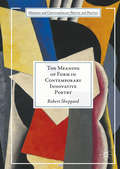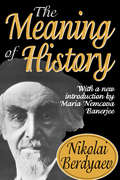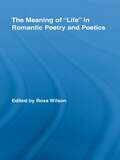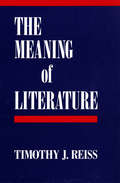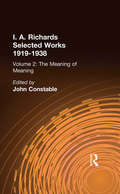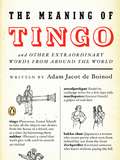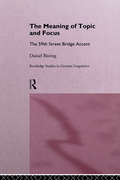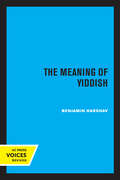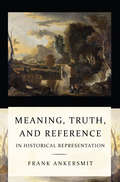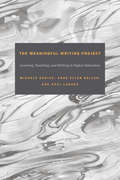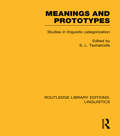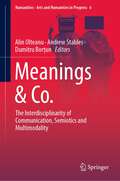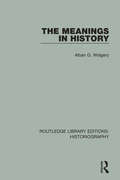- Table View
- List View
Meaning by Shakespeare
by Terence HawkesWe traditionally assume that the `meaning' of each of Shakespeares plays is bequeathed to it by the Bard. It is as if, to the information which used to be given in theatrical programmes, `Cigarettes by Abdullah, Costumes by Motley, Music by Mendelssohn', we should add `Meaning by Shakespeare'. These essays rest on a different, almost opposite, principle. Developing the arguments of the same author's That Shakespearean Rag (1986), they put the case that Shakespeare's plays have no essential meanings, but function as resources which we use to generate meaning. A Midsummer Night's Dream, Measure for Measure, Coriolanus and King Lear, amongst other plays, are examined as concrete instances of the covert process whereby, in the twentieth century, Shakespeare doesn't mean: we mean by Shakespeare. Meaning by Shakespeare concludes with `Bardbiz', a review of recent critical approaches to Shakespeare, which initiated a long-running debate (1990-1991) when it first appeared in The London Review of Books.
Meaning, Discourse and Society
by Wolfgang TeubertMeaning, Discourse and Society investigates the construction of reality within discourse. When people talk about things such as language, the mind, globalisation or weeds, they are less discussing the outside world than objects they have created collaboratively by talking about them. Wolfgang Teubert shows that meaning cannot be found in mental concepts or neural activity, as implied by the cognitive sciences. He argues instead that meaning is negotiated and knowledge is created by symbolic interaction, thus taking language as a social, rather than a mental, phenomenon. Discourses, Teubert contends, can be viewed as collective minds, enabling the members of discourse communities to make sense of themselves and of the world around them. By taking an active stance in constructing the reality they share, people thus can take part in moulding the world in accordance with their perceived needs.
Meaning in Interaction: An Introduction to Pragmatics (Learning about Language)
by Jenny A. ThomasMeaning in Interaction: An Introduction to Pragmatics is a comprehensive introductory text which discusses the development of pragmatics - its aims and methodology - and also introduces themes that are not generally covered in other texts.Jenny Thomas focuses on the dynamic nature of speaker meaning, considering the central roles of both speaker and hearer, and takes into account the social and psychological factors involved in the generation and interpretation of utterances. The book includes a detailed examination of the development of Pragmatics as a discipline, drawing attention to problems encountered in earlier work, and brings the reader up to date with recent discussion in the field. The book is written principally for students with no previous knowledge of pragmatics, and the basic concepts are covered in considerable detail. Theoretical and more complicated information is highlighted with examples that have been drawn from the media, fiction and real-life interaction, and makes the study more accessible to newcomers. It is an ideal introductory textbook for students of linguistics and for all who are interested in analysing problems in communication.
Meaning in the Brain (The\mit Press Ser.)
by Giosue BaggioAn argument that the meaning of written or auditory linguistic signals is not derived from the input but results from the brain's internal construction process.When we read a text or listen to speech, meaning seems to be given to us instantaneously, as if it were part of the input. In Meaning in the Brain, Giosuè Baggio explains that this is an illusion created by the tremendous speed at which sensory systems and systems for meaning and grammar operate in the brain. Meaning, Baggio argues, is not derived from input but results from the brain's internal construction process. With this book, Baggio offers the first integrated, multilevel theory of semantics in the brain, describing how meaning is generated during language comprehension, production, and acquisition. Baggio's theory draws on recent advances in formal semantics and pragmatics, including vector-space semantics, discourse representation theory, and signaling game theory. It is designed to explain a growing body of experimental results on semantic processing that have accumulated in the absence of a unifying theory since the introduction of electrophysiology and neuroimaging methods.Baggio argues that there is evidence for the existence of three semantic systems in the brain—relational semantics, interpretive semantics, and evolutionary semantics—and he discusses each in turn, developing neural theories of meaning for all three. Moreover, in the course of his argument, Baggio addresses several long-standing issues in the neuroscience of language, including the role of compositionality as a principle of meaning construction in the brain, the role of sensory-motor processes in language comprehension, and the neural and evolutionary links among meaning, consciousness, sociality, and action.
Meaning in the Media
by Alan DurantMeaning in the Media addresses the issue of how we should respond to competing claims about meaning put forward in confrontations between people or organisations in highly charged circumstances such as bitter public controversies and expensive legal disputes. Alan Durant draws attention to the pervasiveness and significance of such meaning-related disputes in the media, investigating how their 'meaning' dimension is best described and explained. Through his analysis of deception, distortion, bias, false advertising, offensiveness and other kinds of communicative behaviour that trigger interpretive disputes, Durant shows that we can understand both meaning and media better if we focus in new ways on moments in discourse when the apparently continuous flow of understanding and agreement breaks down. This lively and contemporary volume will be invaluable to students and teachers of linguistics, media studies, journalism and law.
Meaning Is Everywhere: Language, Artificial Intelligence, Society
by Prashant ParikhMeaning Is Everywhere sketches a theory of meaning from the ground up—with potentially profound consequences. In a sweeping narrative that arcs from the origins of meaning through the emergence of present-day science and technology, Prashant Parikh offers a fresh perspective on some of the most significant challenges and opportunities of the contemporary world, including the promise of AI, relief from scarcity and polarization, and the possibility of at least partial utopias.
Meaning Making: A Special Issue of Discourse Processes
by Timothy KoschmannThis special issue focuses on the difficult problem of how observers and researchers can make sense of how collaborating participants develop a shared understanding both of their task and their own participation in it. Or stated in another way, how can we derive meaning from their emergent and situated meaning making? Meaning making has been studied under a variety of names, and can be conceptualized on different levels of abstraction and from a variety of perspectives. The goal is to attempt to tease apart some of these views, while at the same time seeking means to bring them together in order to provide a more fully elaborated picture. This issue comes with a CD-ROM containing the brief video segment which all authors analyzed in the preparation of their contributions.
Meaning Making in Text
by Sonja Starc Carys Jones Arianna MaioraniMeaning Making in Text extends the notion of text as a vehicle for ever-changing and complex forms of communication. Based on recent developments in Systemic Functional Linguistics (SFL), it proposes a range of analytical tools for accessing a variety of discourses in different contexts. The book presents studies of linguistic and multimodal phenomena concerning English and minority European languages that, until now, have received very limited attention, and offers proposals for analysingtext in terms of their application to pedagogy. The contributors demonstrate the increasingly rich potential of SFL to provide a refreshingly powerful account of human nature and the ways it can be applied that go well beyond those to do with language itself.
The Meaning of Constructions (Elements in Construction Grammar)
by Benoît Leclercq Cameron MorinThis Element offers a primer for the study of meaning in a Construction Grammar approach. It reviews the main principles of meaning shared across constructionist frameworks, including its ubiquity in grammatical structure, its usage-based formation, and its nature as the output of cognitive representations. It also reviews the importance given to meaning in construction-based explanations of sentence composition, innovative language use, and language change. Paradoxically, the Element shows that there is no systematic framework delineating the rich structure of constructional meaning, which has led to theoretical disagreements and inconsistencies. It therefore proposes an operational model of meaning for practitioners of Construction Grammar. It details the characteristics of a complex interface of semantic, pragmatic, and social meaning, and shows how this framework sheds light on recent theoretical issues. The Element concludes by considering ways in which this framework can be used for future descriptive and theoretical research questions.
The Meaning of Everything: The Story of the Oxford English Dictionary
by Simon WinchesterIt was on New Year's morning, 1928, that an eruption of mad lexical glee from a battered old typewriter on a desk in Baltimore from the hands of Henry Louis Mencken sent news all across the USA of the long-awaited publication of the book that was to crown the English language undisputed monarch of the linguistic kingdom. From the Oxford-based project a total of 414,825 words, ten times as many as had hitherto been suspected of existing, had now been recognized and catalogued, the results of seventy years of Herculean effort by scholars, linguists, and thousands of ordinary and not-so-ordinary people. "The Meaning of Everything" is a readily accessible historical account of the making of the remarkable Oxford English Dictionary, leading up to the appointment of the first editor, James Murray, in 1879 through to its triumphant publication in 1928 and beyond.
The Meaning of Focus Particles: A Comparative Perspective
by Ekkehard KönigFocus particles (words such as even, only, also) play an important role in English, in various syntactic and semantic domains, but their characteristics pose numerous problems for current syntactic frameworks and semantic theories. This book presents a comprehensive analysis of the syntax, meaning and use of focus particles and related function words in English and many other languages. It also provides a historical perspective on their development.
The Meaning of Form in Contemporary Innovative Poetry
by Robert SheppardThis study engages the life of form in contemporary innovative poetries through both an introduction to the latest theories and close readings of leading North American and British innovative poets. The critical approach derives from Robert Sheppard's axiomatic contention that poetry is the investigation of complex contemporary realities through the means (meanings) of form. Analyzing the poetry of Rosmarie Waldrop, Caroline Bergval, Sean Bonney, Barry MacSweeney, Veronica Forrest-Thomson, Kenneth Goldsmith, Allen Fisher, and Geraldine Monk, Sheppard argues that their forms are a matter of authorial design and readerly engagement.
The Meaning of History
by Daniel PipesIn her brilliant new opening essay, Banerjee says of Berdyaev "he was never more than a curious but unwelcome guest in history. He fearlessly engaged it on the level of ideas while remaining alien to its means and ends, gifted with an incurable longing for transcendence." Witness to two world wars, Berdyaev observed the destruction of established cultures in the traumatic birth of new systems. Arrested on political suspicion-by Czarist and then by Bolshevik police—he died in exile in France in 1948, carrying forth his intellectual work until the end.Berdyaev considered the philosophy of history as a field that laid the foundations of the Russian national consciousness. Its disputes were centered on distinctions between Slavophiles and Westerners, East and West. The Meaning of History was an early effort, following World War I, that attempted to revive this perspective. With the removal of Communism as a ruling system in Russia, that nation returned to an elaboration of a religious philosophy of history as the specific mission of Russian thought. This volume thus has contemporary significance. Its sense of the apocalypse, which distinguishes Russian from Western thought, gives the book its specifically religious character.In order to grasp and oppose the complex phenomenon of social and cultural disintegration, Berdyaev shows that human beings must rely upon some internal dialectic. After the debacle of the war, the moment arrived to integrate Russian historical experiences into those of a Europe, which, although torn by schism, still claimed to be the descendant of Christendom. The book is remarkable for its powerful stylistic grace, and astonishingly contemporary feeling.
The Meaning of Life in Romantic Poetry and Poetics (Routledge Studies in Romanticism)
by Ross WilsonThis volume brings together an impressive range of established and emerging scholars to investigate the meaning of ‘life’ in Romantic poetry and poetics. This investigation involves sustained attention to a set of challenging questions at the heart of British Romantic poetic practice and theory. Is poetry alive for the Romantic poets? If so, how? Does ‘life’ always mean ‘life’? In a range of essays from a variety of complementary perspectives, a number of major Romantic poets are examined in detail. The fate of Romantic conceptions of ‘life’ in later poetry also receives attention. Through, for examples, a revision of Blake’s relationship to so-called rationalism, a renewed examination of Wordsworth’s fascination with country graveyards, an exploration of Shelley’s concept of survival, and a discussion of the notions of ‘life’ in Byron, Kierkegaard, and Mozart, this volume opens up new and exciting terrain in Romantic poetry’s relation to literary theory, the history of philosophy, ethics, and aesthetics.
The Meaning of Literature
by Timothy J. ReissIn this searching and wide-ranging book, Timothy J. Reiss seeks to explain how the concept of literature that we accept today first took shape between the mid-sixteenth century and the early seventeenth, a time of cultural transformation. Drawing on literary, political, and philosophical texts from Central and Western Europe, Reiss maintains that by the early eighteenth century divergent views concerning gender, politics, science, taste, and the role of the writer had consolidated, and literature came to be regarded as an embodiment of universal values.During the second half of the sixteenth century, Reiss asserts, conceptual consensus was breaking down, and many Western Europeans found themselves overwhelmed by a sense of social decay. A key element of this feeling of catastrophe, Reiss points out, was the assumption that thought and letters could not affect worldly reality. Demonstrating that a political discourse replaced the no-longer-viable discourse of theology, he looks closely at the functions that letters served in the reestablishment of order. He traces the development of the idea of literature in texts by Montaigne, Spenser, Sidney, Shakespeare, Lope de Vega, and Cervantes, among others; through seventeenth-century writings by such authors as Davenant, Boileau, Dryden, Rymer, Anne Dacier, Astell, and Leibniz; to eighteenth-century works including those of Addison, Pope, Batteux and Hutcheson, Burke, Lessing, Kant, and Wollstonecraft. Reiss follows key strands of the tradition, particularly the concept of the sublime, into the nineteenth century through a reading of Hegel's Aesthetics.The Meaning of Literature will contribute to current debates concerning cultural dominance and multiculturalism. It will be welcomed by anyone interested in literature and in cultural studies, includingliterary theorists and historians, comparatists, intellectual historians, historical sociologists, and philosophers.
Meaning Of Meaning V 2: A Study Of The Influence Of Language Upon Thought And Of The Science Of Symbolism
by John ConstableFirst Published in 2001. Routledge is an imprint of Taylor & Francis, an informa company.
The Meaning of Meat and the Structure of the Odyssey
by Egbert J. BakkerThis comprehensive study of the Odyssey sees in meat and meat consumption a centre of gravitation for the interpretation of the poem. It aims to place the cultural practices represented in the poem against the background of the (agricultural) lived reality of the poem's audiences in the archaic age, and to align the themes of the adventures in Odysseus' wanderings with the events that transpire at Ithaca in the hero's absence. The criminal meat consumption of the suitors of Penelope in the civilised space of Ithaca is shown to resonate with the adventures of Odysseus and his companions in the pre-cultural worlds they are forced to visit. The book draws on folklore studies, the anthropology of hunting cultures, the comparative study of oral traditions, and the agricultural history of archaic and classical Greece. It will also be of interest to narratologists and students of folklore and Homeric poetics.
The Meaning of Tingo
by Adam Jacot de BoinodDid you know that people in Indonesia have a word that means 'to take off your clothes in order to dance'? Or how many words the Albanians have for eyebrows and moustaches? Or that the Dutch word for skimming stones is plimpplamppletteren? Drawing on the collective wisdom of over 154 languages, this intriguing book is arranged by theme so you can compare attitudes all over the world to such subjects as food, the human body and the battle of the sexes. Here you can find not only those words for which there is no direct counterpart in English (such as the Japanese age-otori which means looking less attractive after a haircut), but also a frank discussion of exactly how many 'Eskimo' terms there are for snow, and a vast array of information exploring the wonderful and often downright strange world of words. Oh, and tingo means 'to take all the objects one desires from the house of a friend, one at a time, by asking to borrow them'.
The Meaning of Topic and Focus: The 59th Street Bridge Accent (Routledge Studies in Germanic Linguistics)
by Daniel BüringThis study provides an illuminating and ground-breaking account of the complex interaction of intonational phenomena, semantics and pragmatics. Based on examples from German and English, and centred on an analysis of the fall-rise intonation contour, a semantic interpretation for two different pitch accents - Focus and Topic - is developed. The cross-sentence, as well as the sentence internal semantic effects of these accents, follow from the given treatment. The account is based on Montogovian possible world semantics and Chomskian generative syntax.
The Meaning of Yiddish
by Benjamin HarshavThis title is part of UC Press's Voices Revived program, which commemorates University of California Press’s mission to seek out and cultivate the brightest minds and give them voice, reach, and impact. Drawing on a backlist dating to 1893, Voices Revived makes high-quality, peer-reviewed scholarship accessible once again using print-on-demand technology. This title was originally published in 1990.
Meaning, Truth, And Reference In Historical Representation
by Frank AnkersmitIn this book, the noted intellectual historian Frank Ankersmit provides a systematic account of the problems of reference, truth, and meaning in historical writing. He works from the conviction that the historicist account of historical writing, associated primarily with Leopold von Ranke and Wilhelm von Humboldt, is essentially correct but that its original idealist and romanticist idiom needs to be translated into more modern terms. Rehabilitating historicism for the contemporary philosophy of history, he argues, "reveals the basic truths about the nature of the past itself, how we relate to it, and how we make sense of the past in historical writing. "At the heart of Ankersmit's project is a sharp distinction between interpretation and representation. The historical text, he holds, is first and foremost a representation of some part of the past, not an interpretation. The book's central chapters address the concept of historical representation from the perspectives of reference, truth, and meaning. Ankersmit then goes on to discuss the possible role of experience in the history writing, which leads directly to a consideration of subjectivity and ethics in the historian's practice. Ankersmit concludes with a chapter on political history, which he maintains is the "basis and condition of all other variants of historical writing. " Ankersmit's rehabilitation of historicism is a powerfully original and provocative contribution to the debate about the nature of historical writing.
The Meaningful Writing Project: Learning, Teaching and Writing in Higher Education
by Michele Eodice Anne Ellen Geller Neal LernerIn the face of the continuing discourse of crisis in US education, The Meaningful Writing Project offers readers an affirming story of writing in higher education that shares students’ experiences in their own voices. In presenting the results of a three-year study consisting of surveys and interviews of university seniors and their faculty across three diverse institutions, authors Michele Eodice, Anne Ellen Geller, and Neal Lerner consider students’ perceptions of their meaningful writing experiences, the qualities of those experiences, and instructors’ perspectives on assignment design and delivery. This study confirms that meaningful assignments offer students opportunities to engage with instructors, peers, and texts and are relevant to past experiences and passions as well as to future aspirations and identities. Meaningful writing occurs across majors, in both required and elective courses, and beyond students’ years at college. Additionally, the study makes clear that faculty across the curriculum devote significant care and attention to creating writing assignments that support student learning, as they understand writing performance to be a developmental process connected to overall cognitive and social development, student engagement with learning, and success in a wide variety of disciplines and professions. The Meaningful Writing Project provides writing center directors, WPAs, other composition scholars, and all faculty interested in teaching and learning with writing an unprecedented look into the writing projects students find meaningful.
Meanings and Prototypes: Studies in Linguistic Categorization (Routledge Library Editions: Linguistics)
by S. L. TsohatzidisThere are fewer distinctions in any language than there are distinct things in the universe. If, therefore, languages are ways of representing the universe, a primary function of their elements must be to allow the much more varied kinds of elements out of which the universe is made to be categorized in specific ways. A prototype approach to linguistic categories is a particular way of answering the question of how this categorization operates. It involves two claims. First, that linguistic categorization exploits principles that are not specific to language but characterize most, if not all, processes of cognition. Secondly, that a basic principle by which cognitive and linguistic categories are organized is the prototype principle, which assigns elements to a category not because they exemplify properties that are absolutely required of each one of its members, but because they exhibit, in varying degrees, certain types of similarity with a particular category member which has been established as the best example (or: prototype) of its kind. The development of the prototype approach into a satisfactory body of theory obviously requires both that its empirical base be enriched, and that its conceptual foundations be clarified. These are the areas where this volume, in its 26 essays, makes original contributions. The first two parts contain discussions in which various kinds of linguistic phenomena are analysed in ways that make essential use of prototype notions. The last two parts contain discussions in which prototype notions themselves become the object, rather than the instrument, of analytical scrutiny.
Meanings & Co.: The Interdisciplinarity of Communication, Semiotics and Multimodality (Numanities - Arts and Humanities in Progress #6)
by Alin Olteanu Andrew Stables Dumitru BorţunThis book explores the interdisciplinarity of semiotics and communication studies, comprising both theoretical explorations and semiotic applications to communication with theoretical bearings. These disciplines have generally been understood as mutually implicit, but there still are many unexplored research avenues in this area, particularly on a conceptual level. The book offers broad insights into the epistemological relations between semiotics and other approaches to communication from perspectives such as sociology, philosophy of language and communication theory. As such, it sheds light on the communication of knowledge.Semiotics is currently enjoying increasing popularity within the humanities and social sciences. Understood as relational logic (Charles Peirce) or hermeneutics (structuralism and poststructuralism), semiotics fundamentally implies certain positions with regard to communication. Because of the generality and conceptual vagueness of semiosis and communication, how one elucidates the other is still an underexplored theme. With some pioneering studies of this relation, the books examines various fields, such as language, code, learning, embodiment, political communication, media, cinema, cuisine, multimodality and intertextuality.
The Meanings in History (Routledge Library Editions: Historiography)
by Alban G. WidgeryIn this book, originally published in 1967, the author gives his views of history, from reflection on living history as distinct from books about past history. He sees histories as the related histories of individuals and gives an account of the meanings in those individuals’ lives and defends the beliefs dominatnly held in relation to them. He challenges professional historians to concern themselves with the fundamentals of history, and philosophers to return to the cnsideration of problems persistent in the previous history of philosophy, occidental and oriental.
